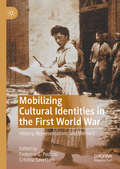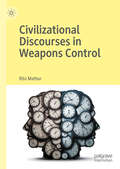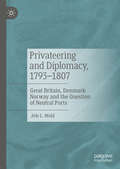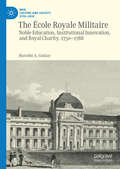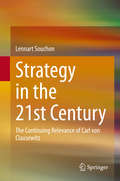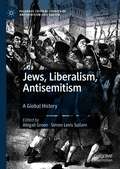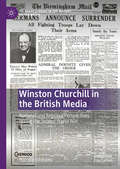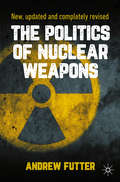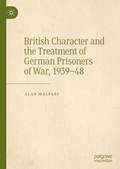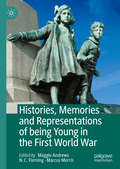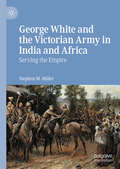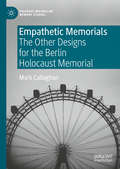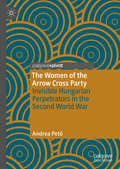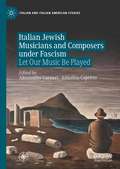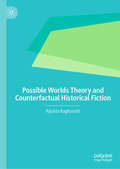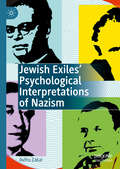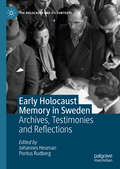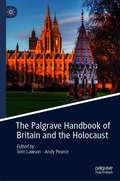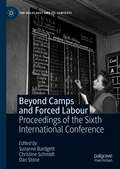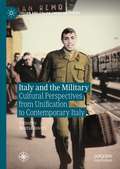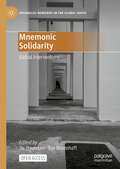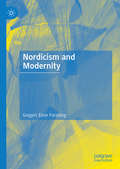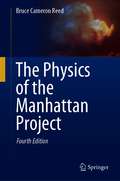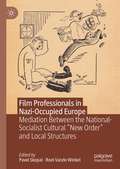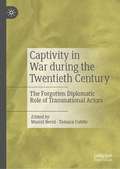- Table View
- List View
Mobilizing Cultural Identities in the First World War: History, Representations and Memory
by Federica G. Pedriali Cristina SavettieriThis book tackles cultural mobilization in the First World War as a plural process of identity formation and de-formation. It explores eight different settings in which individuals, communities and conceptual paradigms were mobilized. Taking an interdisciplinary approach, it interrogates one of the most challenging facets of the history of the Great War, one that keeps raising key questions on the way cultures respond to times of crisis. Mobilization during the First World War was a major process of material and imaginative engagement unfolding on a military, economic, political and cultural level, and existing identities were dramatically challenged and questioned by the whirl of discourses and representations involved.
Civilizational Discourses in Weapons Control
by Ritu MathurThis book seeks to decolonize practices of arms control and disarmament. In this endeavor it seeks to problematize our understanding of time and civilization as rhetorical resources. The need for such an undertaking can be premised on the claim that while problems of modernity, ethnocentrism and universalism are now a central concern within the field of international relations, these ideas are scarcely debated or contested within the field of arms control and disarmament. The singular focus on technological innovations and specific policy-oriented agreements in practices of arms control and disarmament appears to stymie the need for such engagements. This book is an invitation to explore intersecting discourses on colonialism, racialism, nationalism and humanitarianism within a historically grounded terrain of weapons control. An understanding of these practices is vital not to prescribe any standards of civilization or exceptionalism in weapons control but to be cognizant through critique of the dangers embedded in any effort at reconstellating the constitutional nuclear order.
Privateering and Diplomacy, 1793–1807: Great Britain, Denmark-Norway and the Question of Neutral Ports
by Atle L. WoldThis book addresses the British-Danish diplomatic debate on privateering and neutral ports in the period 1793-1807, when Denmark-Norway remained neutral in the war between Britain and France. The British government protested against the use French privateers made of Norwegian ports as bases for their attacks on the British Baltic Sea and Archangel Trades, but the Danish government insisted on keeping the ports open. This led to a running dispute on the relative rights and duties of belligerents and neutrals, but also on violations of the tentative agreement that the two governments reached in 1793. The three main chapters in the book address the principled debate on privateering and neutral ports; the central role played in the debate by the British diplomatic and consular representatives in Denmark-Norway; and privateering in practice. The final two chapters look at the impact of the Dutch change of sides in the war in 1795, and the development from the official closure of the Norwegian ports to privateers in 1799 until Denmark-Norway’s entry into the war on the side of France in 1807.
The École Royale Militaire: Noble Education, Institutional Innovation, and Royal Charity, 1750-1788 (War, Culture and Society, 1750 –1850)
by Haroldo A. GuízarThis book explores the Paris Ecole Militaire as an institution, arguing for its importance as a school that presented itself as a model for reform during a key moment in the movement towards military professionalism as well as state-run secular education. The school is distinguished for being an Enlightenment project, one of its founders publishing an article on it in the Encyclopédie in 1755. Its curriculum broke completely with the Latin pedagogy of the dominant Jesuit system, while adapting the legacy of seventeenth-century riding academies. Its status touches on the nature of absolutism, as it was conceived to glorify the Bourbon dynasty in a similar way to the girls’ school at Saint Cyr and the Invalides. It was also a dispensary of royal charity calculated to ally the nobility more closely to royal interests through military service. In the army, its proofs of nobility were the model for the much debated 1781 Ségur decree, often described as a notable cause of the French Revolution.
Strategy in the 21st Century: The Continuing Relevance of Carl von Clausewitz
by Lennart SouchonThis book presents a detailed discussion of Clausewitz's principal lines of thought and methods of implementation. It elaborates on his main objective of laying a foundation for the education of up-and-coming creative, knowledgeable and experienced future leaders. The book encourages reflection and study in strategic thinking in order to transform knowledge into genuine capability. The book explores the question of what a twenty-first-century decision-maker can learn from these strategic lines of thought. It bridges the gap between philosophical theory and strategic interaction in conflicts with an equal opponent. Readers learn to understand and employ the clash of wills, attack and defence, and friction, and in essence the necessary virtues of a strategic commander.The findings presented help to identify the essential features in complex decision-making situations and developing possible courses of strategic action from a holistic standpoint. As such, the book is a must read for strategists, business practitioners, and scholars of political leadership and management interested in a better understanding of strategy and decision-making.
Jews, Liberalism, Antisemitism: A Global History (Palgrave Critical Studies of Antisemitism and Racism)
by Abigail Green Simon Levis Sullam“This is a timely contribution to some of the most pressing debates facing scholars of Jewish Studies today. It forces us to re-think standard approaches to both antisemitism and liberalism. Its geographic scope offers a model for how scholars can “provincialize” Europe and engage in a transnational approach to Jewish history. The book crackles with intellectual energy; it is truly a pleasure to read.”- Jessica M. Marglin, University of Southern California, USAGreen and Levis Sullam have assembled a collection of original, and provocative essays that, in illuminating the historic relationship between Jews and liberalism, transform our understanding of liberalism itself. - Derek Penslar, Harvard University, USA“This book offers a strikingly new account of Liberalism’s relationship to Jews. Previous scholarship stressed that Liberalism had to overcome its abivalence in order to achieve a principled stand on granting Jews rights and equality. This volume asserts, through multiple examples, that Liberalism excluded many groups, including Jews, so that the exclusion of Jews was indeed integral to Liberalism and constitutive for it. This is an important volume, with a challenging argument for the present moment.”- David Sorkin, Yale University, USAThe emancipatory promise of liberalism – and its exclusionary qualities – shaped the fate of Jews in many parts of the world during the age of empire. Yet historians have mostly understood the relationship between Jews, liberalism and antisemitism as a European story, defined by the collapse of liberalism and the Holocaust. This volume challenges that perspective by taking a global approach. It takes account of recent historical work that explores issues of race, discrimination and hybrid identities in colonial and postcolonial settings, but which has done so without taking much account of Jews. Individual essays explore how liberalism, citizenship, nationality, gender, religion, race functioned differently in European Jewish heartlands, in the Mediterranean peripheries of Spain and the Ottoman empire, and in the North American Atlantic world.
Winston Churchill in the British Media: National and Regional Perspectives during the Second World War (Palgrave Studies in the History of the Media)
by Hanako IshikawaThe book explores how Churchill was portrayed in the UK press during the Second World War, comparing his depictions in Scottish, Welsh, Northern Irish, and provincial English newspapers. By using a variety of newspapers from these areas, it examines local opinions about Churchill at the time he was the wartime prime minister. It analyses how Churchill was received and depicted by newspapers in the UK and why differences in these depictions emerged in each area. It contributes to the study of public opinion in the war and of Churchill’s reputation, of the British media, as well as to the study of the notion of Britishness, focusing on local perspectives.
The Politics of Nuclear Weapons: New, updated and completely revised
by Andrew FutterThis comprehensively updated second edition provides an introduction to the political, normative, technological and strategic aspects of nuclear weaponry. It offers an accessible overview of the concept of nuclear weapons, outlines how thinking about these weapons has developed and considers how nuclear threats can continue to be managed in the future. This book will help you to understand what nuclear weapons are, the science behind their creation and operation, why states build them in the first place, and whether it will be possible for the world to banish these weapons entirely. Essential reading for all students of International Relations, Security Studies and Military History.
British Character and the Treatment of German Prisoners of War, 1939–48
by Alan MalpassThis book examines attitudes towards German held captive in Britain, drawing on original archival material including newspaper and newsreel content, diaries, sociological surveys and opinion polls, as well as official documentation and the archives of pressure groups and protest movements. Moving beyond conventional assessments of POW treatment which have focused on the development of policy, diplomatic relations, and the experience of the POWs themselves, this study refocuses the debate onto the attitude of the British public towards the standard of treatment of German POWs. In so doing, it reveals that the issue of POW treatment intersected with discussions of state power, human rights, gender relations, civility, and national character.
Histories, Memories and Representations of being Young in the First World War
by Maggie Andrews N. C. Fleming Marcus MorrisThis book seeks to place children and young people centrally within the study of the contemporary British home front, its cultural representations and its place in the historical memory of the First World War. This edited collection interrogates not only war and its effects on children and young people, but how understandings of this conflict have shaped or been shaped by historical memories of the Great War, which have only allowed for several tropes of childhood during the conflict to emerge. It brings together new research by emerging and established scholars who, through a series of tightly focussed case studies, introduce a range of new histories to both explore the experience of being young during the First World War, and interrogate the memories and representations of the conflict produced for children. Taken together the chapters in this volume shed light on the multiple ways in which the Great War shaped, disrupted and interrupted childhood in Britain, and illuminate simultaneously the selectivity of the portrayal of the conflict within the more typical national narratives.
George White and the Victorian Army in India and Africa: Serving the Empire
by Stephen M. MillerThis book offers a detailed investigation of George S. White’s career in the British Army. It explores late Victorian military conflicts, British power dynamics in Africa and Asia, civil-military relations on the fringes of the empire, and networks of advancement in the army. White served in the Indian Rebellion and, twenty years later, the Second Anglo-Afghan War, where he earned the Victoria Cross. After serving in the Sudan campaign, White returned to India and held commands during the conquest and pacification of Upper Burma and the extension of British control over Balochistan, and, as Commander-in-Chief, sent expeditions to the North-West Frontier and oversaw major military reforms. Just before the start of the South African War, White was given the command of the Natal Field Force. This force was besieged in Ladysmith for 118 days. Relieved in 1900, White was heralded as the “Defender of Ladysmith.” He was made Field-Marshal in 1903.
Empathetic Memorials: The Other Designs for the Berlin Holocaust Memorial (Palgrave Macmillan Memory Studies)
by Mark CallaghanThis book is a study of the Berlin Holocaust Memorial Competitions of the 1990s, with a focus on designs that kindle empathetic responses. Through analysis of provocative designs, the book engages with issues of empathy, secondary witnessing, and depictions of concentration camp iconography. It explores the relationship between empathy and cultural memory when representations of suffering are notably absent. The book submits that one design represents the idea of an uncanny memorial, and also pays attention to viewer co-authorship in counter-monuments. Analysis of counter-monuments also include their creative engagement with German history and their determination to defy fascist aesthetics. As the winning design for The Memorial to the Murdered Jews of Europe is abstract with an information centre, there is an exploration of the memorial museum. Callaghan asks whether this configuration is intended to compensate for the abstract memorial’s ambiguity or to complement the design’s visceral potential. Other debates explored concern political memory, national memory, and the controversy of dedicating the memorial exclusively to murdered Jews.
The Women of the Arrow Cross Party: Invisible Hungarian Perpetrators in the Second World War
by Andrea PetőThis book analyses the actions, background, connections and the eventual trials of Hungarian female perpetrators in the Second World War through the concept of invisibility. It examines why and how far-right women in general and among them several Second World War perpetrators were made invisible by their fellow Arrow Cross Party members in the 1930s and during the war (1939-1945), and later by the Hungarian people’s tribunals responsible for the purge of those guilty of war crimes (1945-1949). It argues that because of their ‘invisibilization’ the legacy of these women could remain alive throughout the years of state socialism and that, furthermore, this legacy has actively contributed to the recent insurgence of far-right politics in Hungary. This book therefore analyses how the invisibility of Second World War perpetrators is connected to twenty-first century memory politics and the present-day resurgence of far-right movements.
Italian Jewish Musicians and Composers under Fascism: Let Our Music Be Played (Italian and Italian American Studies)
by Alessandro Carrieri Annalisa CapristoThis book is the first collection of multi-disciplinary research on the experience of Italian-Jewish musicians and composers in Fascist Italy. Drawing together seven diverse essays from both established and emerging scholars across a range of fields, this book examines multiple aspects of this neglected period of music history, including the marginalization and expulsion of Jewish musicians and composers from Italian theatres and conservatories after the 1938–39 Race Laws, and their subsequent exile and persecution. Using a variety of critical perspectives and innovative methodological approaches, these essays reconstruct and analyze the impact that the Italian Race Laws and Fascist Italy’s musical relations with Nazi Germany had on the lives and works of Italian Jewish composers from 1933 to 1945. These original contributions on relatively unresearched aspects of historical musicology offer new insight into the relationship between the Fascist regime and music.
Possible Worlds Theory and Counterfactual Historical Fiction
by Riyukta RaghunathThis book offers a comprehensive Possible Worlds framework with which to analyse counterfactual historical fiction. Counterfactual historical fiction is a literary genre that comprises narratives set in worlds whose histories run contrary to the history of our world, usually speculating on what would have happened had a significant historical event (such as a war) turned out differently. The author develops a systematic critical approach based on a customised model of Possible Worlds Theory supplemented by cognitive concepts that account for the different processes that readers go through when they read counterfactual historical fiction, a genre which relies heavily on pre-existing knowledge about history and culture. This book will be of interest to anyone working with Possible Worlds, including within the fields of philosophy, literary studies, stylistics, cognitive poetics, and narratology.
Jewish Exiles’ Psychological Interpretations of Nazism
by Avihu ZakaiThis book examines works of four German-Jewish scholars who, in their places of exile, sought to probe the pathology of the Nazi mind: Wilhelm Reich’s The Mass Psychology of Fascism (1933), Erich Fromm’s Escape from Freedom (1941), Siegfried Kracauer’s From Caligari to Hitler: A Psychological History of the German Film (1947), and Erich Neumann’s Depth Psychology and a New Ethic (1949). While scholars have examined these authors’ individual legacies, no comparative analysis of their shared concerns has yet been undertaken, nor have the content and form of their psychological inquiries into Nazism been seriously and systematically analyzed. Yet, the sense of urgency in their works calls for attention. They all took up their pens to counter Nazi barbarism, believing, like the English jurist and judge Sir William Blackstone, who wrote in 1753 - scribere est agere ("to write is to act").
Early Holocaust Memory in Sweden: Archives, Testimonies and Reflections (The Holocaust and its Contexts)
by Johannes Heuman Pontus RudbergThis book investigates the memory of the Holocaust in Sweden and concentrates on early initiatives to document and disseminate information about the genocide during the late 1940s until the early 1960s. As the first collection of testimonies and efforts to acknowledge the Holocaust contributed to historical research, judicial processes, public discussion, and commemorations in the universalistic Swedish welfare state, the chapters analyse how and in what ways the memory of the Holocaust began to take shape, showing the challenges and opportunities that were faced in addressing the traumatic experiences of a minority. In Sweden, the Jewish trauma could be linked to positive rescue actions instead of disturbing politics of collaboration, suggesting that the Holocaust memory was less controversial than in several European nations following the war. This book seeks to understand how and in what ways the memory of the Holocaust began to take shape in the developing Swedish welfare state and emphasises the role of transnational Jewish networks for the developing Holocaust memory in Sweden.
The Palgrave Handbook of Britain and the Holocaust
by Tom Lawson Andy PearceThis handbook is the most comprehensive and up-to-date single volume on the history and memory of the Holocaust in Britain. It traces the complex relationship between Britain and the destruction of Europe’s Jews, from societal and political responses to persecution in the 1930s, through formal reactions to war and genocide, to works of representation and remembrance in post-war Britain. Through this process the handbook not only updates existing historiography of Britain and the Holocaust; it also adds new dimensions to our understanding by exploring the constant interface and interplay of history and memory. The chapters bring together internationally renowned academics and talented younger scholars. Collectively, they examine a raft of themes and issues concerning the actions of contemporaries to the Holocaust, and the responses of those who came ‘after’. At a time when the Holocaust-related activity in Britain proceeds apace, the contributors to this handbook highlight the importance of rooting what we know and understand about Britain and the Holocaust in historical actuality. This, the volume suggests, is the only way to respond meaningfully to the challenges posed by the Holocaust and ensure that the memory of it has purpose.
Beyond Camps and Forced Labour: Proceedings of the Sixth International Conference (The Holocaust and its Contexts)
by Suzanne Bardgett Christine Schmidt Dan StoneThis book presents a selection of the newest research on themes amplified by the sixth annual Beyond Camps and Forced Labour conference on the post-Holocaust period, including ‘displaced persons’, reception and resettlement, exiles and refugees, trials and justice, reparation and restitution, and memory and testimony. The chapters highlight new, transnational approaches and findings based on underused and newly opened archives, including compensation files of the British government; on historical actors often on the periphery within English-language historiography, including Romanian and Hungarian survivors; and new approaches such as the spatial history of Drancy, as well as geographies that have undergone less scrutiny, for example, Tehran, Chile, Mexico and Cyprus. This volume represents the vibrant and varied state of research on the aftermath of the Holocaust.
Italy and the Military: Cultural Perspectives from Unification to Contemporary Italy (Italian and Italian American Studies)
by Mattia RoveriThis book sheds new light on the role of the military in Italian society and culture during war and peacetime by bringing together a whole host of contributors across the interdisciplinary spectrum of Italian Studies. Divided into five thematic units, this volume examines the continuous and multifaceted impact of the military on modern and contemporary Italy. The Italian context offers a particularly fertile ground for studying the cultural impact of the military because the institution was used not only for defensive/offensive purposes, but also to unify the country and to spread ideas of socio-cultural and technological development across its diverse population.
Mnemonic Solidarity: Global Interventions (Entangled Memories in the Global South)
by Eve Rosenhaft Jie-Hyun LimThis open access book provides a concise introduction to a critical development in memory studies. A global memory formation has emerged since the 1990s, in which memories of traumatic histories in different parts of the world, often articulated in the terms established by Holocaust memory, have become entangled, reconciled, contested, conflicted and negotiated across borders. As historical actors and events across time and space become connected in new ways, new grounds for contest and competition arise; claims to the past that appeared de-territorialized in the global memory formation become re-territorialized – deployed in the service of nationalist projects. This poses challenges to scholarship but also to practice: How can we ensure that shared or comparable memories of past injustice continue to be grounds for solidarity between different memory communities? In chapters focusing on Europe, East Asia and Africa, five scholars respond to these challenges from a range of disciplinary perspectives in the humanities.
Nordicism and Modernity
by Gregers Einer ForsslingThis book offers a complete narrative of the development of Nordicism, from its roots in the National Romantic movement of the late eighteenth century, through to its most notorious manifestation in Nazi Germany, and finally to the fragmented forms that still remain in contemporary society. It is distinctive in treating Nordicism as a phenomenon with its own narrative, rather than as discreet episodes in works studying aspects of Eugenics, Nationalism, Nazism and the reception history of Old Norse culture. It is also distinctive in applying to this narrative a framework of analysis derived from the parallel theories of Roger Griffin and Zygmunt Bauman, to examine Nordicism as a process of myth creation protecting both the individual and society from the challenges and terror of an ever-changing and accelerating state of modernity.
The Physics of the Manhattan Project: How Nuclear Physics Became A Global Geopolitical Game-changer (Undergraduate Lecture Notes In Physics Ser.)
by Bruce Cameron ReedThe development of nuclear weapons during the Manhattan Project is one of the most significant scientific events of the twentieth century. This revised and updated 4th edition explores the challenges that faced the scientists and engineers of the Manhattan Project. It gives a clear introduction to fission weapons at the level of an upper-year undergraduate physics student by examining the details of nuclear reactions, their energy release, analytic and numerical models of the fission process, how critical masses can be estimated, how fissile materials are produced, and what factors complicate bomb design. An extensive list of references and a number of exercises for self-study are included. Revisions to this fourth edition include many upgrades and new sections. Improvements are made to, among other things, the analysis of the physics of the fission barrier, the time-dependent simulation of the explosion of a nuclear weapon, and the discussion of tamped bomb cores. New sections cover, for example, composite bomb cores, approximate methods for various of the calculations presented, and the physics of the polonium-beryllium "neutron initiators" used to trigger the bombs.The author delivers in this book an unparalleled, clear and comprehensive treatment of the physics behind the Manhattan project.
Film Professionals in Nazi-Occupied Europe: Mediation Between the National-Socialist Cultural “New Order” and Local Structures
by Pavel Skopal Roel Vande WinkelThis book analyses the film industries and cinema cultures of Nazi-occupied countries (1939-1945) from the point of view of individuals: local captains of industry, cinema managers, those working for film studios and officials authorized to navigate film policy. The book considers these people from a historical perspective, taking into account their career before the occupation and, where relevant, pays attention to their post-war lives. The perspectives of these historical agents” contributes to an understanding of how top-down orders and haphazard signals from the occupying administration were moulded, adjusted and distorted in the process of their translation and implementation. This edited collection offers a more dynamic and less deterministic approach to research on the international expansion of Third-Reich cinema in World War Two; an approach that strives to balance the role of individual agency with the structural determinants. The case studies presented in this book cover the territories of Belgium, Czechoslovakia, France, the Netherlands, Norway, Poland and the Soviet Union.
Captivity in War during the Twentieth Century: The Forgotten Diplomatic Role of Transnational Actors
by Marcel Berni Tamara CubitoThis book offers new international perspectives on captivity in wartime during the twentieth century. It explores how global institutions and practices with regard to captives mattered, how they evolved and most importantly, how they influenced the treatment of captives. From the beginning of the twentieth century, international organisations, neutral nations and other actors with no direct involvement in the respective wars often had to fill in to support civilian as well as military captives and to supervise their treatment. This edited volume puts these actors, rather than the captives themselves, at the centre in order to assess comparatively their contributions to wartime captivity. Taking a global approach, it shows that transnational bodies - whether non-governmental organisations, neutral states or individuals - played an essential role in dealing with captives in wartime. Chapters cover both the largest wars, such as the two World Wars, but also lesser-known conflicts, to highlight how captives were placed at the centre of transnational negotiations.
